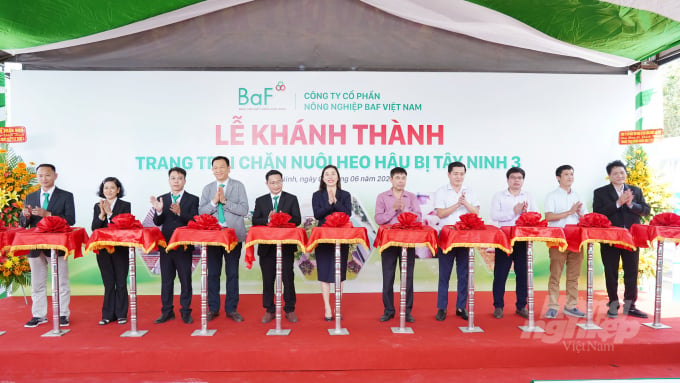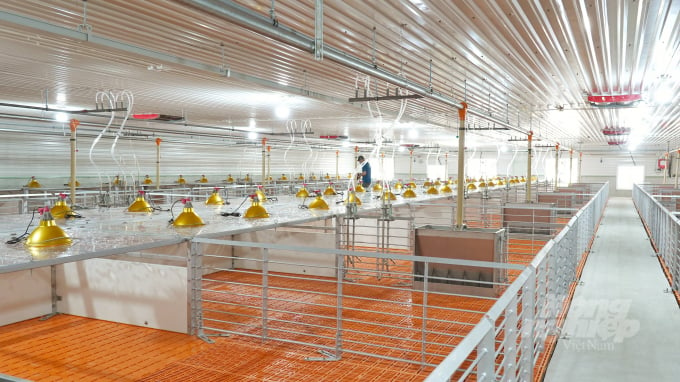November 26, 2025 | 09:02 GMT +7
November 26, 2025 | 09:02 GMT +7
Hotline: 0913.378.918
November 26, 2025 | 09:02 GMT +7
Hotline: 0913.378.918
As part of the strategy of expanding closed hi-tech farming system, BAF Viet Nam Agriculture Joint Stock Company (BaF Vietnam) on June 8 held an inauguration ceremony of the breeding pig farm- Tay Ninh No.3 in Tan Bien district, Tay Ninh province.

BaF's Executive Board is cutting the ribbon at the inauguration ceremony of breeding gilt farm No.3 in Tay Ninh. Photo: KL.
The newly-invested breeding pig farm in Tay Ninh is built and operated according to the European standards with 8 barns for gilts and 1 barn for weaners. With the introduction of automation feeding system and inverter technology in ventilation system, the farm will be cool in the summer and warm in the winter, at the same time the moisture, dirt and disease microorganism will be eliminated; thereby keeping pigs healthy.
The main characteristics of the feeding and cooling system is automatically operated through a central control system, ensuring effectiveness and efficiency in the management of large-scale livestock farming. In addition, the farm pays attention to the elements such as biosecurity, breeding technologies and environmental friendliness. Vehicles and visitors must go through a strict isolation and disinfection process before entering the farm and reaching the production area.
Most importantly, advanced waste treatment system is also introduced in the farm to deal with environment pollution thoroughly. Additionally, the farm uses top ranked technology meeting the standards of the Ministry of Health to treat water in the farm for daily use right in office and residential area. This is a closed process according to the 3F model (Feed-Farm-Food) , creating and sharing goodness from farm to table.

A hi-tech weaner barn at BaF Vietnam's breeding pig farm. Photo: KL.
Ms. Bui Huong Giang, General Director of BaF Vietnam said BaF invested methodically in advanced technologies with an eye to bringing safe, tasty and healthy food to consumers. Besides, by continuously expanding the scale of existing farms, BaF Vietnam not only confirms the efficiency of its strategy but also contributes to local economic development, creating jobs and stable incomes for employees.
On June 9, BaF Vietnam continues to start construction on breeding pig farm No.7 in Tay Ninh with a scale of 60,000 breeding gilts per year in order to achieve its objective of putting 6 more pig farms into operation in 2022.
BAF Viet Nam Agriculture Joint Stock Company (BaF Vietnam) was established in 2017. Its main operating field is pig breeding with the focus on developing the 3F model (Feed-Farm-Food) and building a completely closed process from breeding stock - feed - farm system to meat processing facilities.
In 2022, BaF Vietnam aims at VND5,950 billion consolidated sales and VND402 billion net profit in which the livestock segment is expected to reach VND1,272 billion sales.
Translated by Mai Tham
/2025/11/25/0045-1-135246_13.jpg)
(VAN) Ca Mau is researching a model of sea-encroaching embankments combined with viaducts and logistics service zones, aiming both to prevent erosion and create land funds for marine economic development.

(VAN) The information was shared at the seminar 'Urban Agriculture - Solutions for Developing Green Spaces,' organized by the Kinh te & Do thi Newspaper and the Biotechnology Center of Ho Chi Minh City.
/2025/11/19/4141-2-132831_216.jpg)
(VAN) One of Japfa's outstanding solutions is implementing digital transformation and artificial intelligence (AI) to optimize operations, enhance productivity, and advance sustainable development.
/2025/11/19/4847-1-093540_448.jpg)
(VAN) The Gia Lai Provincial People’s Committee had a working session with the delegation of the U.S. Department of Agriculture, the State of Idaho, and representatives of the State's leading enterprises.

(VAN) Ca Mau has a sufficient foundation to become a strong regional aquaculture center, where production integrates the economy, the environment, and the lives of the people.

(VAN) SEIKI Group envisions itself as a pioneer in the ‘dual transformation’ of digital technology and green industry, standing alongside the Government and Vietnamese businesses in their pursuit of sustainable development.

(VAN) The VNGEONET network affirms Viet Nam's progress in mastering digital space, providing a precise positioning data platform to serve socioeconomic development.